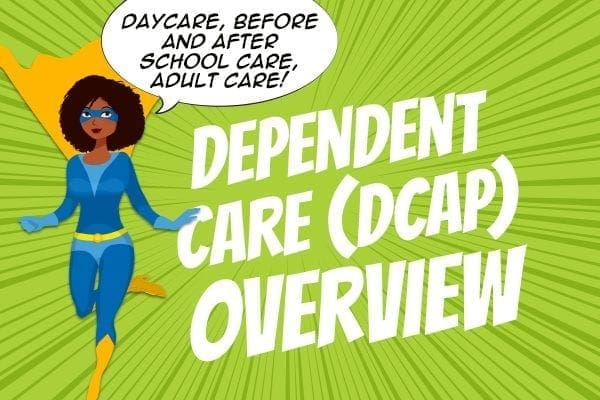

Dependent Care Assistance Plan (DCAP) – A Quick Overview
Do you have small children or an adult dependent who lives with you? If you answered yes, a DCAP account (Dependent Care Assistance Plan) might be just what you need!
DCAP accounts (sometimes called Dependent Care FSAs) are an employer-sponsored benefit that lets employees put aside money to pay for child or adult care while they’re at work or going to school. Each pay period, the employee makes a pre-tax contribution to the DCAP account. After paying for care and filing a claim, the employee receives reimbursement from the account.
In some cases, you can set up automatic reimbursements if your charges will be the same every month.
The DCAP annual limit has been updated with the passage of the One Big Beautiful Bill Act of 2025 (H.R. 1). The new limit is now $7,500 for married parents filing taxes jointly (up from $5,000) for plans starting after December 31, 2025. For parents filing separately, the limit is $3,750.

Using Your Dependent Care Assistance Plan
You can use your DCAP to pay for care services while you (or your spouse) work, look for work, or go to school. A DCAP cannot be used for babysitting or to pay for someone who lives in your home to care for younger children.
Here's a list of what DCAP accounts can cover:
- Daycare
- Before and after school care
- Day camps
- Adult care
Remember that a DCAP is a “use it or lose it” account. Any unspent money at the end of the year is lost. When you enroll in a DCAP, make sure you create an estimate before choosing how much to set aside. In most cases, you cannot change your contributions after the plan year starts.
DCAP Contribution Limits
Type | 2026 |
|---|---|
Married, filing jointly | $7,500 |
Married, filing separately | $3,750 |
Qualified Dependents for DCAP Accounts:
- Children aged 0 – 12 years
- Spouse who cannot physically or mentally care for themselves
- Other dependent who is unable to physically or mentally unable to care for themselves and lives with you for more than half the year
See IRS Publication 503 for more information.
Share:

DCAP Contribution Limits
Type | 2026 |
|---|---|
Married, filing jointly | $7,500 |
Married, filing separately | $3,750 |
